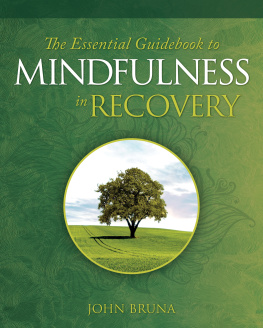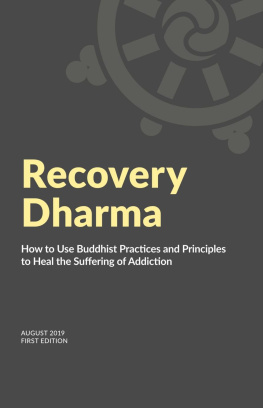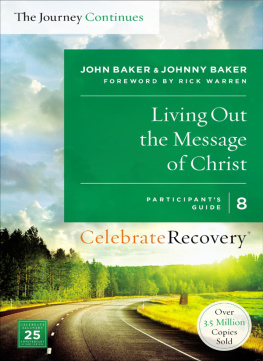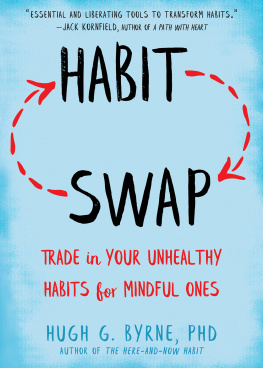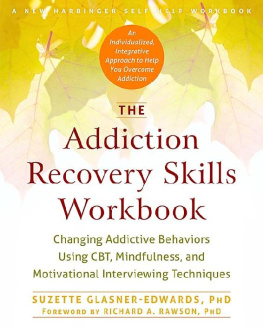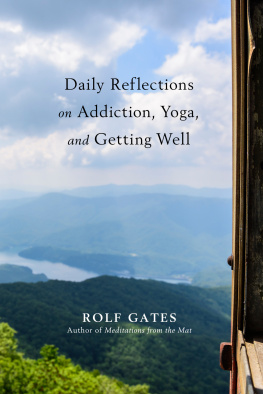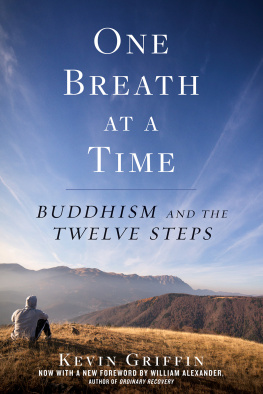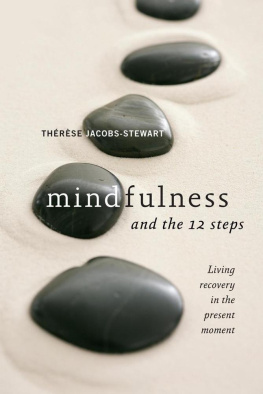
THE ESSENTIAL GUIDEBOOK TO MINDFULNESS IN RECOVERY
The Essential Guidebook to
MINDFULNESS
in RECOVERY
JOHN BRUNA

Central Recovery Press (CRP) is committed to publishing exceptional materials addressing addiction treatment, recovery, and behavioral healthcare topics.
For more information, visit www.centralrecoverypress.com.
2018 by John Bruna
All rights reserved. Published 2018. Printed in the United States of America.
No part of this publication may be reproduced, stored in a retrieval system, or transmitted in any form or by any means, electronic, mechanical, photocopying, recording, or otherwise, without the written permission of the publisher.
Publisher: Central Recovery Press
3321 N. Buffalo Drive
Las Vegas, NV 89129
23 22 21 20 19 181 2 3 4 5
ISBN: 978-1-942094-85-2 (print)
978-1-942094-86-9 (e-book))
Photo of John Bruna by Jeffrey S. Rose. Used with permission.
Every attempt has been made to contact copyright holders. If copyright holders have not been properly acknowledged, please contact us. Central Recovery Press will be happy to rectify the omission in future printings of this book.
Publishers Note: This book contains general information about mindfulness, addiction recovery, and related matters. The information is not medical advice. This book is not an alternative to medical advice from your doctor or other professional healthcare provider.
Our books represent the experiences and opinions of their authors only. Every effort has been made to ensure that events, institutions, and statistics presented in our books as facts are accurate and up-to-date. To protect their privacy, the names of some of the people, places, and institutions in this book may have been changed.
Cover and interior design and layout by Sara Streifel, Think Creative Design.
Like ripples on a pond, our kindness can spread and flow.
We can be a voice of compassion and unity,
skillfully recognizing the value of all.
We can all help improve the world,
one mindful smile and compassionate activity at a time.
John Bruna, The Wisdom of a Meaningful Life
TABLE OF CONTENTS
INTRODUCTION
Whether or not it feels like it right now, you are incredibly fortunate. You have all the resources available to improve your life and become the person you really want to be. The fact that youre reading this guidebook means that all the conditions of your lifeincluding the hardships and struggleshave provided you with the precious opportunity to find recovery and rediscover your worthiness and value as a human being.
All of us who have struggled with our addiction know well the deep emotional and mental pain it has caused ourselves and others. We know what it is like to be completely powerless over our impulses and cravings, consistently acting on them regardless of the consequences. We know well the deep shame we feel as a result of our actions. What we have been unaware of is that we can change. We do not need to be prisoners of our thoughts, emotions, habits, impulses, or cravings. There is no need for us to continue to engage in activities that rob us of our self-worth and dignity.
We can learn skills that allow us to be the people we want to bepeople of integrity, capable of engaging in activities that are in alignment with our deepest values and living lives that are truly meaningful. Instead of being prisoners of unhealthy habits, we can consciously create healthy ones that support our recovery and the lives we want to live.
Throughout our lives, we have all learned to do many things to survive. We have been taught to walk, speak, read, and write and have developed many skills through practice and with the guidance of others. However, few of us have ever been taught how to train our minds. Without training, our minds can easily get caught up in every fear, worry, desire, or impulse that arises.
Rather than being a prisoner of the thoughts and emotions you experience, you can learn to be more mindful, able to consciously respond to thoughts, impulses, and emotions with more choice and freedom. Just like any other skill, all it takes is training and practice. Science has demonstrated that you can literally rewire yourself, creating new neuropathways in your brain. You can do this on purpose, consciously developing healthy habits and attitudes that support the life you want to live.
The Essential Guidebook to Mindfulness in Recovery is designed to help you develop the specific skills that empower you to succeed. You really can change, find freedom, and live the life you find most meaningful! If you are in treatment, you are in a safe and supportive environment, surrounded by highly trained and caring people whose primary concern is to help you develop the inner resources that will allow you to fully engage in your life of recovery. Few people will ever have the opportunity that you have now, so I strongly encourage you to take full advantage of it and start becoming the person you want to be today.
If you are not in treatment and are new to recovery, surround yourself with as many supportive and healthy people as possible and seize this precious opportunity to transform your life. If you have already found recovery and are inspired to tackle problems limiting your full development, this guidebook will be an invaluable resource for you to discover genuine happiness and cultivate tools that will empower you to engage more productively in your life.
WHAT IS MINDFULNESS?
Mindfulness is much more than present-moment awareness. Mindfulness includes and facilitates the cultivation of concentration, wisdom, and the ability to make healthy choices that foster genuine happiness and a meaningful life.
JOHN BRUNA
What is it that prevents us from being the people we want to be? All of us are capable of making a list of things that we can do to improve our lives. Creating such a list is not difficult and would not even take much time; however, few people, whether they struggle with addiction or not, can actually consistently do the things on their list. Why is this the case?
If we can make a list of actions and values that we know would improve the quality of our lives, why is it so difficult to live by them? While there can be many reasons, one of the most common and powerful is simply that we are not even aware of what we are doing throughout much of our lives. Our minds are constantly distracted, going from one thought to another, ruminating about past or future events, and caught up in desire, worries, or concernsall while we are doing other things, such as driving, working, or even trying to listen to a friend. This is why we often do not know where our car keys are even though we put them down just moments ago. Our minds were somewhere else when we set them down. How can we possibly make conscious, healthy choices if we are not even present to make them?
Our distracted and unruly minds are at the root of our problem. We have very little conscious control of our attention. If we are to establish any choice in our lives, we need to be able to direct our attention where we would like it to go rather than have our unruly mind dictate what we think about.
Next page
